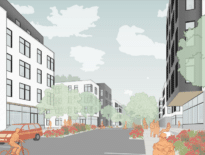
Boston Mayor Michelle Wu speaks to state lawmakers at a Revenue Committee hearing on Wednesday, Oct. 11, 2023. Photo by Chris Lisinski | State House News Service
Senators be aware: If you get a call from a 617 phone number in the coming days, it could be Boston Mayor Michelle Wu.
The mayor’s proposal to temporarily rebalance property tax rates in an attempt to shield residential property owners from a potentially large tax increase is on life support on Beacon Hill. It passed the House but stalled in the Senate, where a major opponent has emerged.
The measure sailed through the House but after Senate President Karen Spilka’s office said Tuesday that there is “no indication that there is sufficient support among Senators” for the plan to move ahead, Wu suggested Wednesday that she may poll all 40 senators herself.
“We are ready to keep still working. We will answer anyone’s questions, I will call every single state senator. We’re ready,” Wu said Wednesday during an interview on “Java With Jimmy.” The mayor also pointed listeners to a blog post she wrote on the topic, breaking down how her proposal fits into the city’s larger financial picture.
The issue escalated into a war of words Tuesday after Wu said on GBH Radio that “every single resident in the city of Boston will know that their taxes are going up because the Senate did not vote through that last step.” Spilka’s office responded by echoing some of the pushback that Wu’s plan, which was approved by the Boston City Council before being sent to Beacon Hill as a home rule petition, has attracted from some business and real estate groups, saying the bill could do “serious damage to Boston’s economy.”
The Senate president’s office also said that it was “politically convenient for the Mayor” to blame the Senate.
Wu responded Wednesday morning and seemed to want to downplay the spat with Spilka, emphasizing that she is not asking the Legislature to do anything unusual or anything that it could not also do for any of the other 350 municipalities in Massachusetts.
“I’m not one to try to use public quotes or statements to start fights with anyone. That’s not my style. I’m not trying to … I really just want to get things done. I’m not asking the State House to sort of lean in and do anything extraordinary. We have something that we need in our city. This is the process that we have, step by step, to go through with them,” she said. “It seems like they interpreted it as I was trying to blame them or something, and I was just answering a question that was asked of me, that this is going to touch every single resident in the city of Boston, and it’s really important for our city.”






